- Clone
- L053E8 (See other available formats)
- Regulatory Status
- RUO
- Other Names
- GPR 9-6, GPR28, CDw199, Chemokine Receptor 9
- Isotype
- Mouse IgG2a, κ
- Ave. Rating
- Submit a Review
- Product Citations
- publications
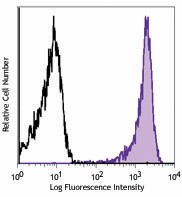
-

Human acute lymphoblastic leukemia cell line, MOLT-4, was stained with CCR9 (clone L053E8) Alexa Fluor® 647 (filled histogram) or mouse IgG2a, κ Alexa Fluor® 647 isotype control (open histogram).
| Cat # | Size | Price | Quantity Check Availability | Save | ||
|---|---|---|---|---|---|---|
| 358911 | 25 tests | 147 CHF | ||||
| 358912 | 100 tests | 347 CHF | ||||
Human CD199, also known as CCR9, is a member of the G protein coupled receptor family and is involved in T cell development in the thymus and in the gut-associated immune response. It is highly expressed on different stages of thymocytes and upregulated on CD4+ CD8+ cells. Expression of CCR9 on γ/δ T cells in the intraepithelial and small intestine has been reported. The interaction of CCR9 with its ligand CCL25 (TECK, thymus-expressed chemokine) may direct the trafficking of developing T cells in the thymus and the generation of gut-specific immunological memory.
Product DetailsProduct Details
- Verified Reactivity
- Human
- Antibody Type
- Monoclonal
- Host Species
- Mouse
- Immunogen
- Cells transfected with human CCR9
- Formulation
- Phosphate-buffered solution, pH 7.2, containing 0.09% sodium azide and BSA (origin USA)
- Preparation
- The antibody was purified by affinity chromatography and conjugated with Alexa Fluor® 647 under optimal conditions.
- Concentration
- Lot-specific (to obtain lot-specific concentration and expiration, please enter the lot number in our Certificate of Analysis online tool.)
- Storage & Handling
- The antibody solution should be stored undiluted between 2°C and 8°C, and protected from prolonged exposure to light. Do not freeze.
- Application
-
FC - Quality tested
- Recommended Usage
-
Each lot of this antibody is quality control tested by immunofluorescent staining with flow cytometric analysis. For flow cytometric staining, the suggested use of this reagent is 5 µl per million cells in 100 µl staining volume or 5 µl per 100 µl of whole blood.
* Alexa Fluor® 647 has a maximum emission of 668 nm when it is excited at 633 nm / 635 nm.
Alexa Fluor® and Pacific Blue™ are trademarks of Life Technologies Corporation.
View full statement regarding label licenses - Excitation Laser
-
Red Laser (633 nm)
- Product Citations
-
- RRID
-
AB_2562523 (BioLegend Cat. No. 358911)
AB_2562523 (BioLegend Cat. No. 358912)
Antigen Details
- Structure
- A member of G-protein coupled receptors which contains seven transmembrane domains. Human CCR9 has above 80% amino acid sequence homology with its mouse counterpart.
- Distribution
-
CD4+CD8+ thymocytes, γ/δ T cells, subset of memory T cells
- Function
- May direct the trafficking of developing T cells in the thymus and generation of gut-specific immunological memory; co-receptor for HIV-1
- Ligand/Receptor
- CCL25
- Cell Type
- T cells, Thymocytes
- Biology Area
- Immunology
- Molecular Family
- CD Molecules, Cytokine/Chemokine Receptors, GPCR
- Antigen References
-
1. Zaballos A, et al. 1999. J. Immunol. 162:5671.
2. Wurbel MA, et al. 2007. J. Immunol. 178:7598.
3. Wurbel MA, et al. 2006. Eur. J. Immunol. 36:73. - Gene ID
- 10803 View all products for this Gene ID
- UniProt
- View information about CD199 on UniProt.org
Related FAQs
- Does staining at room temperature or even at 37°C help for checking chemokine receptors expression?
-
Due to continuous recycling of many chemokine receptors, it may be worthwhile to consider staining at room temperature or at 37°C if the staining at lower temperature (which can potentially reduce receptor turnover) is not optimal.
Other Formats
View All CD199 Reagents Request Custom Conjugation| Description | Clone | Applications |
|---|---|---|
| APC anti-human CD199 (CCR9) | L053E8 | FC |
| PE/Cyanine7 anti-human CD199 (CCR9) | L053E8 | FC |
| PE anti-human CD199 (CCR9) | L053E8 | FC |
| Purified anti-human CD199 (CCR9) | L053E8 | FC |
| PerCP/Cyanine5.5 anti-human CD199 (CCR9) | L053E8 | FC |
| Alexa Fluor® 647 anti-human CD199 (CCR9) | L053E8 | FC |
| Brilliant Violet 421™ anti-human CD199 (CCR9) | L053E8 | FC |
| Biotin anti-human CD199 (CCR9) | L053E8 | FC |
| PE/Dazzle™ 594 anti-human CD199 (CCR9) | L053E8 | FC |
| TotalSeq™-A0843 anti-human CD199 (CCR9) | L053E8 | PG |
| TotalSeq™-C0843 anti-human CD199 (CCR9) | L053E8 | PG |
| TotalSeq™-B0843 anti-human CD199 (CCR9) Antibody | L053E8 | PG |
| KIRAVIA Blue 520™ anti-human CD199 (CCR9) | L053E8 | FC |
| APC/Fire™ 750 anti-human CD199 (CCR9) | L053E8 | FC |
Customers Also Purchased
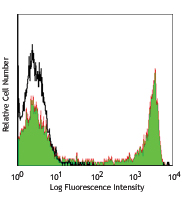
Compare Data Across All Formats
This data display is provided for general comparisons between formats.
Your actual data may vary due to variations in samples, target cells, instruments and their settings, staining conditions, and other factors.
If you need assistance with selecting the best format contact our expert technical support team.
-
APC anti-human CD199 (CCR9)
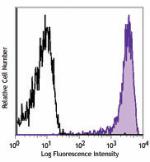
Human acute lymphoblastic leukemia cell line, MOLT-4, was st... -
PE/Cyanine7 anti-human CD199 (CCR9)
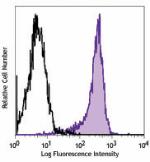
Human acute lymphoblastic leukemia cell line, MOLT-4, was st... -
PE anti-human CD199 (CCR9)
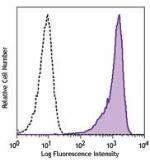
Human acute lymphoblastic leukemia cell line. MOLT-4 cells w... -
Purified anti-human CD199 (CCR9)
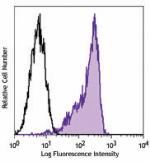
Human acute lymphoblastic leukemia cell line MOLT-4 was stai... -
PerCP/Cyanine5.5 anti-human CD199 (CCR9)
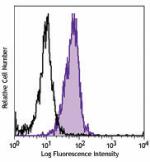
Human acute lymphoblastic leukemia cell line, MOLT-4, was st... -
Alexa Fluor® 647 anti-human CD199 (CCR9)
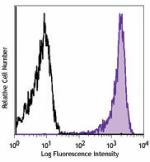
Human acute lymphoblastic leukemia cell line, MOLT-4, was st... -
Brilliant Violet 421™ anti-human CD199 (CCR9)
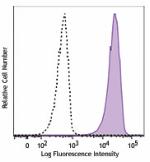
Human acute lymphoblastic leukemia cell line, MOLT-4, was st... -
Biotin anti-human CD199 (CCR9)
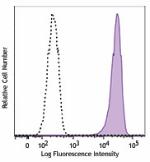
Human acute lymphoblastic leukemia cell line, MOLT-4, was st... -
PE/Dazzle™ 594 anti-human CD199 (CCR9)
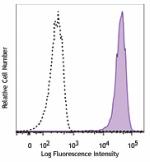
Human acute lymphoblastic leukemia cell line, MOLT-4, was st... -
TotalSeq™-A0843 anti-human CD199 (CCR9)
-
TotalSeq™-C0843 anti-human CD199 (CCR9)
-
TotalSeq™-B0843 anti-human CD199 (CCR9) Antibody
-
KIRAVIA Blue 520™ anti-human CD199 (CCR9)
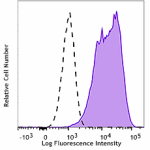
Human acute lymphoblastic leukemia cell line, MOLT-4, was st... -
APC/Fire™ 750 anti-human CD199 (CCR9)
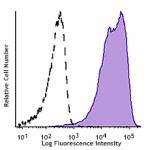
Human acute lymphoblastic leukemia cell line, MOLT-4, was st...

 Login / Register
Login / Register 










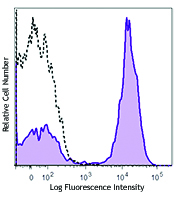
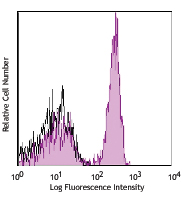




Follow Us